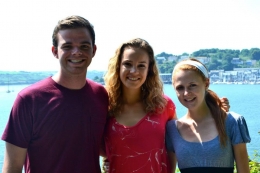In the final Letter to America, DukeEngage participant Jeff Campbell wonders why Ireland can’t decide between the top-down or grassroots approaches to integration
In my time with Dublin’s New Communities Partnership (NCP), I’ve had the chance to work on everything from a citizenship support service to the launch of a social enterprise that could be described as ‘cycling-centred’, though it truly defies description.
As a community advocacy organisation, NCP puts much of its work into ensuring that migrants are represented and heard in local affairs. This summer I worked on a report concerning a Council of Europe convention on the same subject: the Convention on the Participation of Foreigners in Public Life at Local Level, which guarantees basic political rights to all people, urges local councils to represent migrant voices, and secures for foreigners the right to vote in local elections. We want to convince Ireland to ratify the convention, which was drafted in 1989 but failed to gain traction despite an initial show of support from Government.
What I find most interesting about the project is that NCP is essentially arguing that Ireland is already complying with each and every element of the convention, but it has nevertheless refused to ratify it. If we accept that to be true – and based on the evidence I’ve seen, I do – then it follows that there must be something undesirable in taking that step to ratify the convention and send an open statement in support of its principles.
That is where things get strange. As an American university student, and especially one who is studying political science, I am used to approaching problems through a clear theoretical framework. No matter how hands-on the project, even when designing a real-world intervention programme, professors urge us to remember the theoretical underpinning of our plans. So how, then, do I justify a top-down approach (adopting a Council of Europe convention) that advocates for a bottom-up solution (representation of migrants at the local level)? Doesn’t one have to be the right option? Doesn’t an effective pursuit of integration require one or the other?
Admittedly, I’m being a little unimaginative here. There is probably a theoretical justification out there for the combination of the two approaches. But I can guarantee that nobody at NCP, no matter how smart and effective, has mapped it out. And this contrast serves as a clear illustration. Right now in Ireland, theoretical elegance seems like a luxury, and NCP and organisations like it do whatever they can, whether unified or not, in an effort to achieve something that works.
Jeff Campbell is a student at Duke University in Durham, North Carolina in Ireland as part of the DukeEngage programme.












